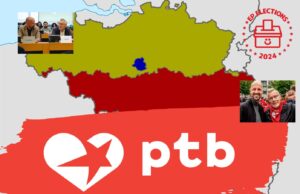Analysis from a partner of transform! in Belgium reporting on the European Elections’ campaign and the hope born by PtB/PVDA.
As in every election in Belgium, the European campaign is largely overshadowed by the legislative and regional elections to be held on the same day. Understanding its dynamics therefore requires an understanding of national issues.
Five years of right-wing government
For the first time since 1988, a government composed solely of right-wing forces has emerged. Bringing together French-speaking and Flemish liberals (MR, ALDE), Flemish Christian Democrats (CD&V, EPP) and Flemish right-wing nationalists (NV-A, ERC), it has set up a particularly regressive socio-economic agenda: raising the retirement age, temporarily suspending the link between wages and inflation, tax gifts to large companies, etc. A recent report pointed to Belgium as one of the countries with the lowest wage increases of all OECD countries since 5 years.
Its effect on social resistance is mixed. The first national trade union demonstrations (with more than 120,000 demonstrators in November 2014) did not have the expected effect. Confronted to government’s intransigence, trade unions quickly entered into a negotiation process with employers and the government. Like many other right-wing executives, the government has also managed to limit the erosion of its image by adopting a tough stance on immigration.
Ethnonationalism in Flanders
This phenomenon was mainly felt on the Flemish side, where the electoral base of the nationalist right is located. By promoting the “politically incorrect” and the defence of the interests of the rich Flemish region against the French-speaking population, the party succeeded in appearing anti-system, while being present at all levels of power.
Feeling a future strong rise of the flemish far right (Vlaams Belang, ENF) whose votes it had siphoned in 2014, which happened in the local elections of October 2018, the N-VA precipitously left the coalition in December 2018, due to the Prime Minister’s choice to sign the Marrakech Pact on Immigration. Despite a slight slowdown, the nationalists are maintaining their position, without limiting the progress of the far right.
A push from the left on the French-speaking side
The phenomenon is totally different on the French-speaking side (Wallonia and Brussels). For the first time in 25 years in the opposition, the french-speaking PS (S&D), once hegemonic, did not benefit much from it. Instead, it seemed to pay the price of anti-social measures passed by the previous socialist-dominated government (2012-2014). PS was then caught up in major financial scandals linked to the party’s control of the Brussels and Walloon regional authorities.
While these same phenomena may have led to the breakthrough of extremism elsewhere, nothing of the sort is happening in the Belgian French-speaking area, since the disappointed workers electorate of the PS seems to be taking refuge within the Belgian Workers Party (PTB, close to GUE/NGL). Expected to win around 15%, the party should obtain at least one MEP, allowing Belgium to have its first radical left-wing European elected official in its history.
A green wave?
The score achieved by ecologists will also be carefully scrutinized. Important social movements, such as school strikes or national climate marches, have unexpectedly put environmental issues at the centre of the political debate, contrary to the identity strategy of the Flemish right. As a result, a “green wave” is expected. In the North, Groen!(Greens/EFA) should mainly be at the expense of the SP.A (S&D), which could record the worst score in its history. In the South, on the other hand, ECOLO (Greens/EFA) could erode on the vote of the urban middle classes acquired on the right, with, paradoxically, a programme much more to the left than its brother party in the North.
If a slight push from the left is expected to the north, the picture should not deviate from the usual: a stronghold for the Right in Flanders, for the Left in Wallonia and mostly in Brussels. This suggests an increase in community tensions between Flemish’s (60% of the population) and french-speakers.
Cover photo source: PTB’s fb page



